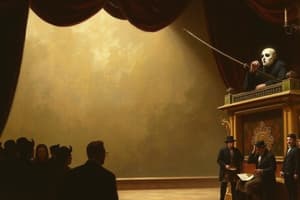Podcast
Questions and Answers
What is the main argument of the Phantom Time Hypothesis?
What is the main argument of the Phantom Time Hypothesis?
The Phantom Time Hypothesis argues that 300 years of history, specifically from 614 to 911 AD, never existed.
Who proposed the Phantom Time Hypothesis and in what decade?
Who proposed the Phantom Time Hypothesis and in what decade?
The hypothesis was proposed by German historian Heribert Illig in the 1990s.
What evidence does Illig provide to support the Phantom Time Hypothesis?
What evidence does Illig provide to support the Phantom Time Hypothesis?
Illig cites calendar discrepancies, lack of architectural evidence, and historical inconsistencies as supporting evidence.
What counterarguments do skeptics present against the Phantom Time Hypothesis?
What counterarguments do skeptics present against the Phantom Time Hypothesis?
Why does the Phantom Time Hypothesis appeal to some people?
Why does the Phantom Time Hypothesis appeal to some people?
How has the concept of phantom time been utilized in popular culture, specifically in TV shows and video games?
How has the concept of phantom time been utilized in popular culture, specifically in TV shows and video games?
What is the general consensus among historians regarding the Phantom Time Hypothesis?
What is the general consensus among historians regarding the Phantom Time Hypothesis?
In what way does the Phantom Time Hypothesis challenge our understanding of history?
In what way does the Phantom Time Hypothesis challenge our understanding of history?
Why is skepticism important when examining historical narratives, as suggested by the implications of the Phantom Time Hypothesis?
Why is skepticism important when examining historical narratives, as suggested by the implications of the Phantom Time Hypothesis?
What does the Phantom Time Hypothesis reveal about the nature of historical research?
What does the Phantom Time Hypothesis reveal about the nature of historical research?
Flashcards
Phantom Time Hypothesis
Phantom Time Hypothesis
The theory that 300 years of history (614-911 AD) never existed due to a deliberate cover-up.
Heribert Illig
Heribert Illig
The German historian who proposed the Phantom Time Hypothesis in the 1990s.
Motivation for the cover-up
Motivation for the cover-up
To create the illusion of living in the year 1000 AD, which was symbolically significant.
Counterarguments to the Hypothesis
Counterarguments to the Hypothesis
Signup and view all the flashcards
Reason for belief in the hypothesis
Reason for belief in the hypothesis
Signup and view all the flashcards
Influence on Fiction
Influence on Fiction
Signup and view all the flashcards
Skepticism in History
Skepticism in History
Signup and view all the flashcards
Subjective Historical Accounts
Subjective Historical Accounts
Signup and view all the flashcards
Complexity of History
Complexity of History
Signup and view all the flashcards
Study Notes
Phantom Time Hypothesis
- The Phantom Time Hypothesis posits that 300 years of history (614-911 AD) never occurred.
- This theory was proposed by German historian Heribert Illig in the 1990s.
- Illig suggests powerful figures like Holy Roman Emperor Otto III, Pope Sylvester II, and Byzantine Emperor Constantine VII orchestrated a cover-up.
- Their goal was calendar manipulation to create the illusion of the 1000 AD symbolic year.
- Illig claims this explains the perceived stagnation of the Middle Ages.
- He suggests that architectural and archaeological evidence for this period is scarce, even suggesting figures like Charlemagne might be fabricated.
Evidence for Phantom Time
- Calendar Discrepancies: Illig argues the Gregorian calendar (1582) was a correction intended to conceal the missing centuries.
- Architectural Evidence: He highlights a lack of surviving structures from the alleged missing years.
- Historical Inconsistencies: Illig points to supposed stagnation in the Byzantine Empire and slow population growth in Europe as evidence of a missing period.
Counterarguments
- Skeptics cite artifacts, manuscripts, and coins from the purported missing centuries.
- Astronomical records detailing historical eclipses and planetary movements dispute the theory.
- Global historical records, including Chinese and Islamic accounts, contradict the hypothesis.
- Historians argue calendar system differences are computational, not manipulative.
Why People Believe the Hypothesis
- The theory offers a captivating conspiracy narrative involving powerful figures.
- It provides a potential explanation for perceived inconsistencies in the Early Middle Ages.
- The concept of hidden truths and historical mysteries appeals to many.
Phantom Time in Pop Culture
- Phantom time influences fiction, including sci-fi with alternative timelines and fantasy exploring reality.
- Shows like Doctor Who and Dark explore rewritten timelines and secret histories.
- Game series like Assassin's Creed use similar concepts, creatively incorporating historical figures and events.
The True Nature of History
- The Phantom Time Hypothesis lacks strong evidence and is widely rejected by historians.
- It highlights the subjective nature of historical accounts and interpreting the past.
- It underscores the need for skepticism when examining historical narratives.
- A nuanced understanding of history requires continuous research and critical thinking.
Studying That Suits You
Use AI to generate personalized quizzes and flashcards to suit your learning preferences.




